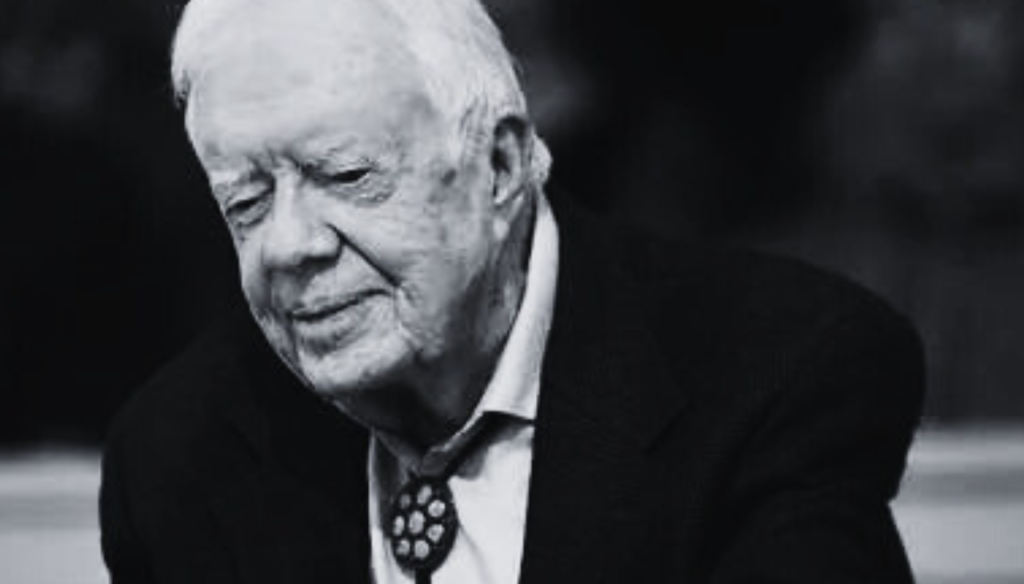Subject: History & Society
Full Name: James Earl Carter Jr.
Date of Birth: October 1, 1924 (Age 99) Plains, Georgia, U.S.
Occupation/Office: Governor of Georgia (1971-1975), President of the United States (1977-1981), Member of the Democratic Party (2006-2008), Grammy Award (2006), Nobel Prize (2002)
He is the husband of Rosalynn Carter and brother of Billy Carter, prominent members of the Carter family.

Jimmy Carter, the 39th President of the United States, is a figure whose legacy transcends the confines of his single term in office. Born on October 1, 1924, in Plains, Georgia, Carter’s journey to the presidency was marked by a deep commitment to public service, a dedication to humanitarian causes, and a steadfast belief in the power of diplomacy and peacekeeping on the world stage.
Carter’s rise to the presidency was anything but conventional. Before entering politics, he distinguished himself as a naval officer, graduating from the United States Naval Academy in 1946. His military service took him to various parts of the world, including the U.S. Navy’s nuclear submarine program. However, it was his return to Plains, Georgia, where he began his foray into local politics, serving as a member of the Sumter County Board of Education and later as a Georgia State Senator.
In 1976, against the backdrop of post-Watergate disillusionment and a desire for change, Jimmy Carter emerged as a relatively unknown figure on the national stage, campaigning on a platform of honesty, integrity, and accountability. His background as a peanut farmer and a born-again Christian resonated with many Americans, who saw in him a fresh face untainted by the political establishment.
Carter’s presidency, which spanned from 1977 to 1981, was characterized by both triumphs and challenges. Domestically, he grappled with issues such as stagflation, energy crises, and rising unemployment. Yet, he also championed progressive policies, including environmental protection, healthcare reform, and deregulation. His creation of the Department of Energy and his advocacy for renewable energy sources reflected his forward-thinking approach to governance.
However, it was on the international stage where Carter made perhaps his most enduring impact. His commitment to human rights and diplomacy led to the negotiation of the Camp David Accords in 1978, a historic peace agreement between Israel and Egypt brokered with the assistance of Carter himself. The accords, which resulted in the normalization of relations between the two nations, earned him widespread acclaim and the Nobel Peace Prize in 2002.
Despite these successes, Carter’s presidency was not without its setbacks. The Iranian Revolution of 1979 and the subsequent hostage crisis, in which 52 Americans were held captive for 444 days, tested Carter’s leadership and strained U.S.-Iranian relations. His attempts to resolve the crisis through diplomacy and a failed rescue mission highlighted the complexities of navigating global politics in an increasingly volatile world.
In the realm of domestic affairs, Carter faced criticism for his handling of the economy and his perceived lack of charisma and political acumen. His presidency was marred by high inflation, unemployment, and a sense of national malaise. These challenges, coupled with his often strained relationship with Congress, contributed to his defeat in the 1980 presidential election by Republican challenger Ronald Reagan.
However, Carter’s legacy extends far beyond his time in office. In the decades since leaving the White House, he has continued to be a tireless advocate for peace, human rights, and social justice. Through his work with the Carter Center, a nonprofit organization dedicated to advancing human rights and alleviating suffering, he has played a pivotal role in promoting democracy and resolving conflicts in countries around the world.
Carter’s post-presidential endeavors, including his involvement in humanitarian efforts such as Habitat for Humanity, have earned him admiration and respect both at home and abroad. His commitment to service and his unwavering dedication to principles of fairness, equality, and compassion serve as a reminder of the enduring importance of public service and civic engagement in shaping a better world.
In reflecting on Jimmy Carter’s life and legacy, it becomes evident that his impact extends far beyond the confines of his presidency. He is not simply a former president but a statesman, a humanitarian, and a beacon of hope in a world often fraught with division and discord. His story is a testament to the power of perseverance, empathy, and leadership in effecting positive change and leaving a lasting legacy of service to humanity.



